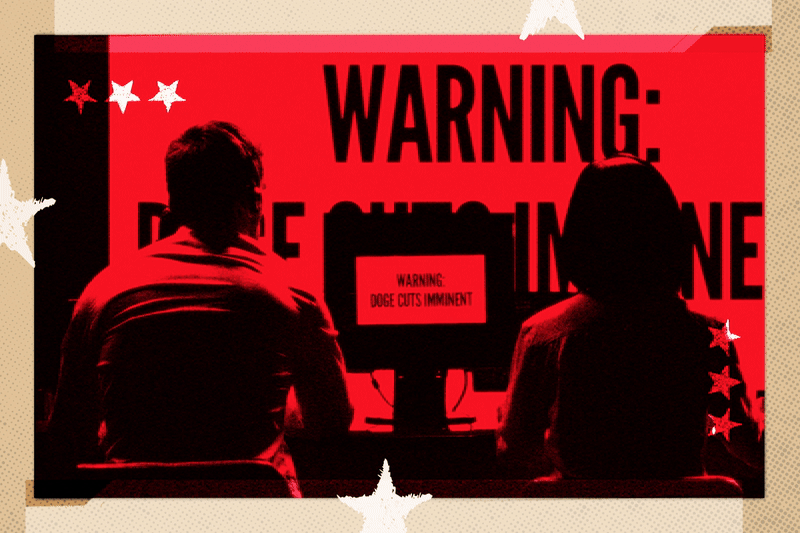I’m a former NASA scientist. The current administration is destroying my health, along with my life’s work.
A 25-year NASA veteran on the costs of being an American scientist under Trump.
By Harley from Home of the Brave
I’ve spent my life as a scientist in pursuit of knowledge about the cosmos. I was extremely fortunate to live in a country that rewarded intellectual curiosity. Decades ago, when I was just getting my start, my country made a commitment to explore the “final frontier,” and to do it faster, better, and with more scientific openness than the Soviet Union or any other country. We succeeded in that mission, which served as an inspiration to millions all over the world, myself included.
About 50 years ago, I earned my PhD and spent the first half of my career in academia. Then, for the last quarter century, I worked in NASA’s science programs, helping to develop the technologies to build America’s space observatories. In this work, NASA was tackling the big questions: What are the origins of life? How did we get here? And are we alone in the universe?
It was a remarkably stimulating career, and if I could go back and do it all over again, I wouldn’t change a thing, nor wish to live anywhere else on Earth. My colleagues made countless discoveries, launched satellites and human spaceflight missions, and broke new ground in understanding the universe and our place in it. All of this was possible only because the US government, throughout my career, supported American science and scientists, valued expertise, and was willing to invest in it.
Now that’s all changing. After coming into office, the current administration cut NASA’s budget drastically and fired thousands of deeply dedicated Americans serving the public interest.
The impacts of these cuts will be felt for generations. We don’t know what we don’t know, and, by cutting resources, we are all but ensured to remain in the dark about those big questions that motivated American scientists throughout my career. Other countries operate well-funded space programs of their own, but to date none has ever matched the resources, knowledge, and expertise found here in the US. That has started to change, as formerly employed NASA scientists and engineers are being eagerly sought by organizations overseas.
As a NASA saying goes: Humans one day will return to the Moon and make all the other discoveries that nature has placed before us. The only question is what language those discoverers will speak.
Less than two years after I retired from NASA, I was given a devastating diagnosis: early-stage Parkinson’s Disease (PD). The condition is incurable, but its symptoms can be treated very well with certain medications. Still, as the condition worsens, I will have fewer options for effective treatment.
Until recently, the best research on a cure for PD was being done here in the US. Federally funded clinical trials and research grants gave people like me hope for a breakthrough of the kind that once led to some of the very medications that have been effective at managing Parkinson’s. It’s particularly—and literally—painful, then, that medical research is being slashed as part of chainsaw-like cutbacks of the federal government.
I’ve spent my life seeking to understand. But gutting American medical research is a decision that I cannot fathom. It’s not only Parkinson’s research that is being terminated. Advanced drug trials and critical research on HIV, childhood cancer, Alzheimer’s, malaria, tuberculosis, and more are on the chopping block as well. Beyond vague statements about “government efficiency,” there has yet to be an explanation as to what slashing lifesaving research in the US is intended to accomplish.
It’s not expensive to cure diseases like these, compared to the human and economic toll of leaving them uncured. And it’s not that expensive to support an American space exploration program, compared to the long-term benefits of the discoveries it will yield. These are things that we, as a nation, once understood that we can and should do, for the good of humanity.
The penalty of funding shortsightedness won't be measured in dollars saved, but in diseases that remain incurable and mysteries that stay unsolved. A generation of brilliant minds will abandon science altogether, if they are not employed elsewhere, leaving us all poorer and more vulnerable to the very challenges America once had the ambition to conquer.
Harley is a former NASA scientist. He is part of Home of the Brave, a new initiative highlighting the harms of this administration’s disastrous policy agenda.




Everyone needs to hear your statement.
Make America Great Again? sure, work on the problems.... but destroy everything that already was great? what sense does that make. Someone in your position is uniquely qualified to speak to the ways in which we as a country, excelled and inspired the world in the fields of medical research and science. I'm not surprised that your former solleagues are being snapped up by other countries. You, and they, are the best and brightest - it makes me heartsick
I’m so sorry to hear your story. Thanks to medical research, my mother survived pancreatic cancer at 77. Then at 89, lived 5 years with blood cancer.
I hate this regime, especially what they’ve done to our scientists and research. I’m trying to help out in anyway I can to get our country back to caring. I hope it can be repaired in my lifetime.
Please take care